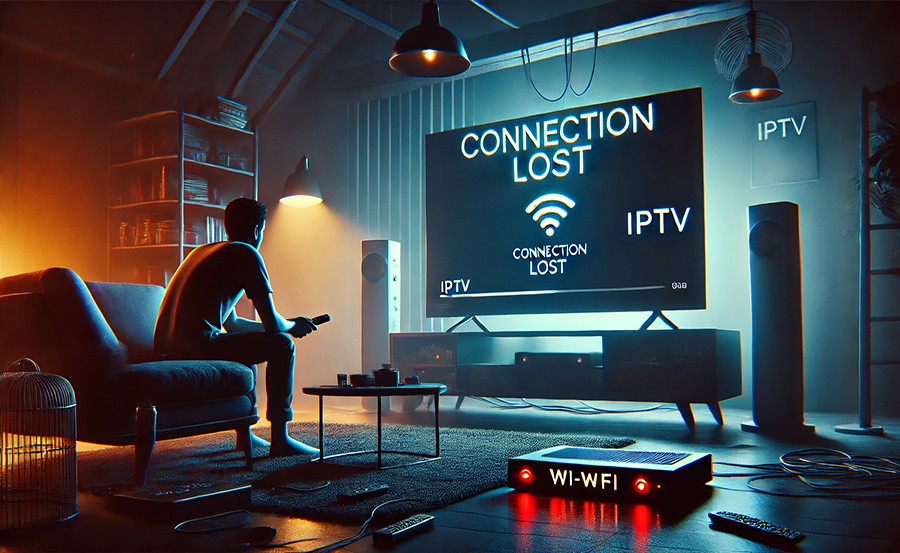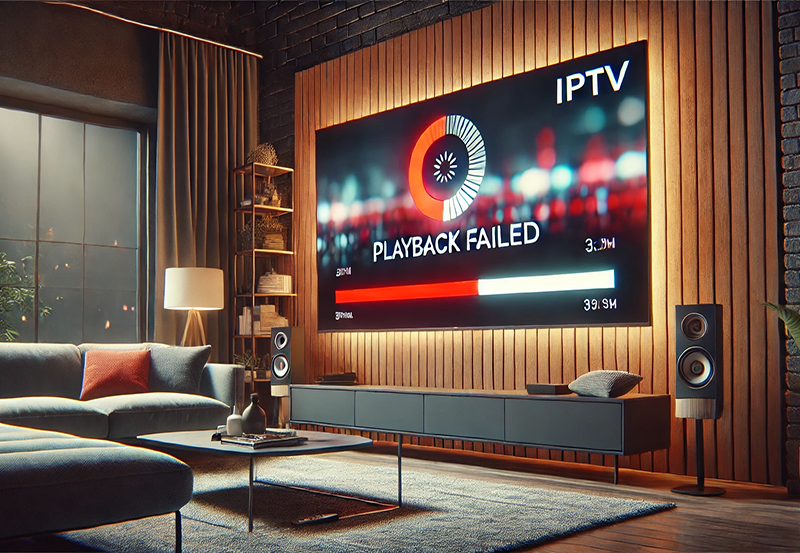In today’s fast-paced digital landscape, Internet Protocol Television (IPTV) stands at the forefront of entertainment technology, offering a convenient and customizable viewing experience. Yet, like any technology, IPTV isn’t without its quirks and challenges. Among the most frustrating issues is the unexpectedly severed connection that leaves viewers staring at a buffering icon. Whether you’re using streaming TV apps or have been doing some IPTV service provider comparison, it’s vital to understand the potential hiccups that may interrupt your viewing pleasure, and more importantly, how to rectify them.
Buy 1 Year IPTV Subscription and Enjoy Unlimited Content
What is IPTV and How Does It Work?
To comprehend the intricacies of IPTV connection issues, it’s imperative first to grasp what IPTV entails. IPTV essentially provides television services over an IP-based network—think the Internet—delivering a more flexible and interactive television experience compared to traditional cable or satellite TV. While it’s commonly associated with video-on-demand services and live streaming TV apps, IPTV also includes time-shifted TV and live programming.
The Backbone of IPTV: An Internet Connection
Unlike traditional broadcast methods, IPTV requires a stable internet connection. The quality of your internet can drastically influence the IPTV experience. Slow speeds or intermittent connectivity might lead to disruptions in your viewing, hence the frequent emphasis on having a reliable service provider.
Content Delivered Through Various Protocols
The IPTV service leverages specific protocols to deliver content, with some of the common ones being HTTP Live Streaming (HLS), Real-Time Messaging Protocol (RTMP), and Real-Time Streaming Protocol (RTSP). Understanding these can offer insight into the technical roots of why your connection might drop. Each protocol comes with its own sets of benefits and potential shortcomings.
Common Causes of Lost IPTV Connection
Now that we’ve established a foundation, let’s explore why your IPTV connection might falter. A dropped connection is not merely an inconvenience—it can be a symptom indicative of a deeper systematic issue.
Internet Connection Issues
A weak or unstable internet connection is among the most prevalent culprits of dropped IPTV service. If your internet speed is too slow or fluctuates, the streaming quality may be compromised.
Insufficient Bandwidth
Bandwidth plays a critical role in the consistency and quality of IPTV playback. Different IPTV services recommend specific minimum internet speeds for SD, HD, and 4K streaming. Consult with your IPTV service provider for these specifications.
Network Congestion
During peak hours, your internet service might slow down due to overutilization, akin to rush hour traffic. Network congestion, especially in densely populated areas, can throttle available bandwidth, causing buffering and disconnections.
Device Compatibility and Set-Up Issues
The compatibility between your device and the IPTV service also warrants consideration. Some legacy devices may not support the needed updates for flawless streaming.
Outdated Hardware
Using older devices that aren’t equipped with the latest software versions can lead to compatibility issues. Ensure that your device is updated regularly to align with the latest IPTV protocols.
Incorrect Settings Configuration
Misconfigured network or app settings can lead to functional hiccups. For instance, incorrect DNS settings or firewall restrictions can disrupt your IPTV service. Regularly checking these can avert connectivity issues.
Service Provider Limitations
Not all IPTV service providers are created equal, and choosing the right one can make a huge difference in your viewing experience.
Insufficient Server Capacity
Server limitations can result in interrupted service, especially during high demand. Opting for a well-reputed IPTV provider with robust infrastructure can alleviate such issues.
Compliance and Licensing Issues
In the quest to explore the best in IPTV entertainment, ensure that your provider complies with regional licensing requirements. Non-compliance can result in service outages enforced by regulatory bodies.
Troubleshooting and Solutions
Identifying the root cause of your IPTV connection issue is only half the battle. Implementing strategic solutions can significantly enhance your viewing experience. Here’s how:
Internet Optimization Strategies
The first step in securing a stable IPTV connection is to optimize your internet service. We’ve already discussed the importance of sufficient bandwidth, but here are additional strategies to reinforce your internet link:
- Opt for a wired connection instead of wireless for steadfast stability.
- Regularly reboot your router to clear cache and provide a fresh start.
- Remove unnecessary devices that are connected to your network and consuming bandwidth.
Device and App Adjustments
After fortifying your internet, focus on the device facilitating your IPTV service. Simple tweaks can often rectify issues:
- Update your device software and associated apps to the latest versions.
- Ensure correct and optimized network settings specific to your region and service.
- Disable or uninstall apps that you rarely use that may interfere with streaming.
Choosing a Reliable IPTV Service Provider
With IPTV service provider comparison being a crucial step, it’s vital to opt for providers with proven track records for stability and customer support. This requires more than just a surface-level review; delve into the nuances of their infrastructure capacity, user reviews, and regulatory compliance.
Evaluating Infrastructure Capability
Top-tier providers typically invest heavily in network infrastructure, ensuring their services are less susceptible to connectivity issues. Their infrastructure should include multiple data centers, redundant network paths, and 24/7 monitoring.
Customer Support and Service Agreements
Excellent customer support can save considerable headaches when issues arise. Look for companies offering comprehensive Service Level Agreements (SLAs), which detail their service commitments and the remedies available to customers if standards are not met.
Exploring the Best in IPTV Entertainment
Popularity aside, the best IPTV entertainment covers a gamut of user preferences and includes must-have features like video quality options, robust content libraries, and user-friendly interfaces. After all, a diversified content offering ensures there is something for everyone in the household.
The Future of IPTV: Emerging Trends and Technologies
IPTV has seen significant growth, but the road ahead is even more promising with newer technological advancements poised to redefine user experience.
Introduction of 5G Technology
With the roll-out of 5G, it gives rise to an era where high-speed, low-latency streaming becomes the norm, offering opportunities for real-time, high-definition content delivery. This transition is bound to improve IPTV’s connectivity issues over time.
Emergence of AI and Machine Learning
Integration of AI in content recommendation systems ensures personalized viewer experiences. This can lead to the development of smarter IPTV systems that learn viewer habits and automatically adjust settings for optimal streaming, reducing common issues associated with user error.
Addressing User Concerns with Practical Solutions
It’s not unusual for potential or current IPTV users to have concerns regarding IPTV systems. Clarifying these concerns through practical solutions not only empowers users but also enhances the overall experience.
Security and Privacy
An apprehension that often prevails amongst users surrounds data privacy and security. Employ endpoint protection measures and avoid unknown or unverified IPTV providers to protect confidential user information.
Costs and Value
As appealing as inexpensive IPTV subscriptions appear, they come with pitfalls that can diminish user experience. Instead, it’s wise to prioritize value for money over the initial savings and invest in top-quality service providers.
At its core, IPTV is more than a passing technological trend; it represents a transformative shift in how we consume media. Tackling connection issues head-on while understanding the broader landscape gives viewers the chance to make informed choices. By understanding the system’s capabilities and addressing issues promptly, users can thoroughly enjoy what IPTV entertainment has to offer.
FAQs: Getting the Most Out Of Your IPTV Experience

Why Does My IPTV Keep Buffering?
Buffering can occur due to a slow internet connection, network congestion, or server bandwidth limitations. Checking your network speed and ensuring you have sufficient bandwidth during peak hours can help mitigate this issue.
Can Switching to a Different IPTV Provider Help With Connectivity Issues?
Yes, it can. Different providers may have different server capacities and infrastructure, which can directly impact performance and reliability. Consistent performance reviews and customer feedback can guide your choice.
How Do I Configure My Device for Optimal IPTV Streaming?
Begin by ensuring your device’s software and IPTV app are updated. Set network configurations according to the recommendations of your IPTV service provider, and remove or disable any non-essential apps that could consume bandwidth.
Is IPTV Legal?
While IPTV technology itself is legal, individual services may not adhere to regional content licensing laws. Always choose providers with transparent policies and verifiable compliance records.
Does 5G Improve IPTV Streaming?
Absolutely. 5G technology facilitates higher internet speeds with lower latency, making it ideal for seamless IPTV streaming. As more infrastructure supports 5G, IPTV services will benefit from enhanced delivery quality.
Unlocking the Secret to Perfect M3U Playback on VLC





